| Srl | Item |
| 1 |
ID:
095596


|
|
|
|
|
| Publication |
2010.
|
| Summary/Abstract |
Despite seemingly little prospects and meager results, many developing countries invest substantial resources in regional cooperation organizations. Considering the widespread skepticism regarding the benefits of these organizations, this enthusiasm is puzzling. This study offers an answer to this puzzle and argues that under certain conditions international organizations among developing countries function as a signal of regional peace and stability. In turn, they reduce the political risk associated with foreign investment and increase the inflow of much needed capital to the economies of their members. I evaluate this argument in the context of the Association of Southeast Asian Nations (ASEAN). I show that Indonesia forcefully promoted the formation of ASEAN and that Indonesian foreign policymakers believed that joining this organization will reverse its aggressive and irresponsible image in the eyes of international donors and investors. Evidence regarding political risk and foreign direct investment in Indonesia and other ASEAN members provide additional support for the argument.
|
|
|
|
|
|
|
|
|
|
|
|
|
|
|
|
| 2 |
ID:
103900


|
|
|
|
|
| Publication |
2010.
|
| Summary/Abstract |
Despite seemingly little prospects and meager results, many developing countries invest substantial resources in regional cooperation organizations. Considering the widespread skepticism regarding the benefits of these organizations, this enthusiasm is puzzling. This study offers an answer to this puzzle and argues that under certain conditions international organizations among developing countries function as a signal of regional peace and stability. In turn, they reduce the political risk associated with foreign investment and increase the inflow of much needed capital to the economies of their members. I evaluate this argument in the context of the Association of Southeast Asian Nations (ASEAN). I show that Indonesia forcefully promoted the formation of ASEAN and that Indonesian foreign policymakers believed that joining this organization will reverse its aggressive and irresponsible image in the eyes of international donors and investors. Evidence regarding political risk and foreign direct investment in Indonesia and other ASEAN members provide additional support for the argument.
|
|
|
|
|
|
|
|
|
|
|
|
|
|
|
|
| 3 |
ID:
120166
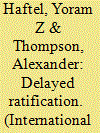

|
|
|
|
|
| Publication |
2013.
|
| Summary/Abstract |
Some treaties are signed and then ratified quickly while others languish in legal limbo, unratified by one or more parties. What explains this variation in the time between signature and ratification? The international relations literature has not taken the ratification stage seriously enough, despite its obvious importance from a legal and a political perspective. We offer a systematic study of this question in the context of bilateral investment treaties. We develop and test a set of theoretical propositions related to domestic-level constraints on the executive, the varying ability of governments to rationally anticipate ratification obstacles, and the bilateral relationship between treaty partners. We generally find support for these propositions but report some surprising findings as well. The article presents implications for investment agreements and treaty making more generally, and raises a number of issues for further study at the intersection of international politics and law.
|
|
|
|
|
|
|
|
|
|
|
|
|
|
|
|
| 4 |
ID:
052898


|
|
|
| 5 |
ID:
068871
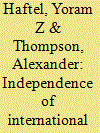

|
|
|
| 6 |
ID:
154844
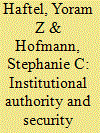

|
|
|
|
|
| Summary/Abstract |
The proliferation of regional economic organizations (REOs) is a prominent feature of the contemporary international environment. Many of these organizations aspire to promote regional peace and stability. Some strive to promote these goals only through economic cooperation, while others have expanded their mandate to include mechanisms that address security concerns more directly. A glance at the security components of such organizations indicates that their purpose and design are very diverse. This article sheds light on the sources of this poorly understood phenomenon. Specifically, it argues that organizations that enjoy greater delegated authority are in a better position to expand their mandate into the security realm and to have more far-reaching agreements in this issue area. It then develops a metric that gauges the degree of security cooperation within REOs and presents a new dataset of numerous organizations on this institutional aspect. Employing this dataset in a rigorous statistical analysis and controlling for a host of alternative explanations, it demonstrates that, indeed, REOs with greater delegated authority develop deeper security cooperation.
|
|
|
|
|
|
|
|
|
|
|
|
|
|
|
|
| 7 |
ID:
059682


|
|
|
| 8 |
ID:
169322
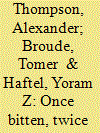

|
|
|
|
|
| Summary/Abstract |
More than 3,000 international investment agreements (IIAs) provide foreign investors with substantive protections in host states and access to binding investor-state dispute settlement (ISDS). In recent years, states increasingly have sought to change their treaty commitments through the practices of renegotiation and termination, so far affecting about 300 IIAs. The received wisdom is that this development reflects a “backlash” against the regime and an attempt by governments to reclaim sovereignty, consistent with broader antiglobalization trends. Using new data on the degree to which IIA provisions restrict state regulatory space (SRS), we provide the first systematic investigation into the effect of ISDS experiences on state decisions to adjust their treaties. The empirical analysis indicates that exposure to investment claims leads either to the renegotiation of IIAs in the direction of greater SRS or to their termination. This effect varies, however, with the nature of involvement in ISDS and with respect to different treaty provisions.
|
|
|
|
|
|
|
|
|
|
|
|
|
|
|
|
| 9 |
ID:
169076
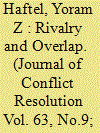

|
|
|
|
|
| Summary/Abstract |
The proliferation and scope expansion of regional organizations (ROs) is one of the most prominent features in contemporary international politics. In particular, many regional economic organizations (REOs) have expanded into the security realm. This trend has often resulted in an overlap with regional security organizations (RSOs) already in place. This study sheds light on this phenomenon by identifying the conditions under which REOs trespass into the security policy domain despite the fact that preexisting RSOs already fulfill security functions. We argue that the presence of strategic rivalries is an important driver of the creation and depth of organizational overlap through scope expansion. Specifically, RSOs that include significant interstate rivalries propel a subgroup of like-minded states to advance and deepen security cooperation through their existing REOs. Using an original data set of security cooperation within economic and security ROs and a quantitative analysis, we find substantial support for this argument.
|
|
|
|
|
|
|
|
|
|
|
|
|
|
|
|